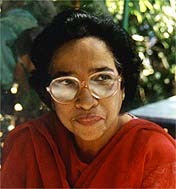When Johann Wolfgang
Goethe the ‘Giant of World Literature,’ took as his mistress the uneducated
maid Christiane Vulpius, it created a social scandal in Weimar’s high society.
It was a love story that weathered the storm of criticism and lasted for all of
28 years. It began one fine day in 1788 when Goethe was taking a leisurely
stroll in a park and Christiane approached him with a petition in favour of her
brother. Her family was in straightened circumstances as her father had been
put in prison for some minor bureaucratic error. Her brother a writer of
adventure novels needed a job to boost the family income.
Goethe was smitten by the girl’s good looks, her rosy
cheeks, her sparkling eyes and her buxom figure. He took her home for a live-in
relationship that lasted 18 years, before he made an honest woman out of her, through marriage on 19th October 1806 at the Jacobskirke in Weimar.
Weimar’s high society both the womenfolk and the Literati like Schiller and
Thomas Mann were highly critical of his choice. Mann called her ‘a beautiful
piece of meal.’ The women resented Christiane because she had robbed them of
Goethe’s attention. Charlotte von Stein his lover was livid. Charlotte the wife
of Schiller called her a ‘round nothing’ and Bettina von Arnim named her ‘a
black pudding.’ Even Goethe’s mother thought she was a sensual ‘bed treasure’
with no claims to intellectual ability.
But though Christiane had little education and was of no
social standing, she was a good wife and a loving companion. For her, Goethe’s
welfare was supreme. When their first child Julius August Walther was born on 25th
December 1789, Goethe greeted him with the words “Love formed you. You will
receive just love.” He even prevailed upon Karl Augustus the Duke of Weimar to
be the child’s godfather. But the child’s crying disturbed his work and he took
himself off to Italy for long periods, returning only when the desire to be
with Christiane took hold of him. Goethe’s mother came to know of Christiane
and her grandson only in 1792.
Three more children were born to Christiane. But none of
them survived due to complications of Rhesus incompatibility. Goethe was away
for most of the time during her pregnancies and was never present during her
labours. As his literary productivity increased, he spent more time away from
home.
A strong friendship developed between Goethe and
Schiller. When Goethe’s family moved into a large house in Frauenplan,
Christiane proved a warm and friendly hostess in spite of Schiller’s animosity
towards her. She was always kind and caring and never offensive. Schiller
however, considered her only as Goethe’s housekeeper, and lacked the civility
to thank her for her hospitality.
On their silver anniversary, Goethe dedicated a poem
‘Gefunden’ (Discovery) to Christiane. Years later, her nephew Wolfgang Volpius
wrote in her biography, “No wife who has reached her silver wedding anniversary
year has ever got a more meaningful and more tender greeting from her husband.”
Christiane died of uraemia on 6th June 1816.
She had previously suffered two strokes and had painful convulsions during her
death. She died alone. Goethe was never beside her when she needed him most.
She was buried at Jakobsfriedhof in Weimar. After her death, Schiller’s wife
wrote of Goethe, “The poor man wept bitterly. It grieves me that he should shed
tears for such objects.”
Christiane provided emotional sustenance to Goethe. She did
not feel any sense of inferiority or inadequacy in spite of the barbs and insults
thrown at her by Weimar’s society. She had a great capacity to love. Goethe’s mother
had to agree that ‘she was a wonderful unspoiled creature.’ As Gary Oliver says,
“Real love is choosing to make an unconditional commitment to an imperfect person.”
After her death Goethe became fat and ugly and began drinking
wine excessively. He died on March 22nd 1832.
